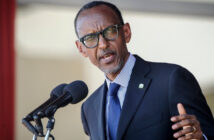While no Nigerian made it to 2017 Time’s 100 Most Influential list, the only South African on the list deserves to be recognized and celebrated. Dr. Glenda Gray, the pioneering medical researcher, who specializes in the search for a vaccine for HIV/Aids, is selected on the Time magazine’s prestigious 100 most influential people in 2017.
Dr. Glenda Gray joins previous South African Time100ers such as comedian Trevor Noah, former Public Protector Thuli Madonsela and tech entrepreneur Elon Musk. This year’s list includes US presidential adviser Ivanka Trump, Russian President Vladimir Putin, humanitarian Melinda Gates and singer Kendrick Lamar.
Gray is the president and CEO of the South African Medical Research Council (SMRC), and also leads a group of internationally acclaimed medical researchers giving hope to people living with HIV/Aids. Its landmark contribution is the development and implementation of a pioneering HIV vaccine efficacy trial that has been running over the past seven years.
In the Time profile, editor Siobhan O’Conner calls Gray a dedicated and passionate pioneer, and highlights her research that led to a dramatic drop in mother-to-child HIV transmission and babies born with the virus — from 600,000 a year to 150,000. Part of Gray’s leadership in ongoing research and medical trials is the development of an early infant inoculation system.
“[Gray’s] ongoing HIV vaccine study is the largest of its kind ever conducted in South Africa, and with it, Gray is once again doing her part to make sure that the science of HIV — and the conversation around it — never stops evolving,” writes O’Conner.
The doctor’s courageous drive and fearlessness in questioning the status quo was, according to her official SMRC biography, developed by her tireless work in fighting against apartheid. During the 1980s Gray was at the forefront of calling for the desegregation of the country’s hospitals and allowing access to medical treatment for all South Africans. After 1994, Gray worked closely with Nelson Mandela’s first democratic government in tackling the growing HIV/Aids problem.
She founded South Africa’s first perinatal HIV clinic in 1993, offering testing and counselling facilities for pregnant women in townships. The clinic, together with the University of the Witwatersrand, was also at the forefront of HIV/Aids research. Later, Gray campaigned vigorously for cost-effective HIV treatments for developing countries.
In 2001, Gray and others helped to form the Treatment Action Campaign (TAC), which fought tirelessly for the distribution of treatment to HIV-positive pregnant women in South Africa. In 2002, alongside her colleague Dr James McIntyre, she received the Nelson Mandela Health and Human Rights Award for their research. In presenting the award to Gray and her team, Mandela recognized that “beyond doubt and argument” that giving drugs to pregnant women was central to the fight against HIV/Aids.
In 2003, Gray and McIntyre were honoured with a Heroes in Medicine Award by the International Association of Physicians in Aids Care. She was also awarded South Africa’s highest national honour, the Order of Mapungubwe (Silver) in 2013 for both her activism during apartheid and her pioneering medical research.
Regarding the Time 100 honour, Gray paid tribute to those around her who had been part of the trailblazing work, she said: “I wouldn’t be here if it weren’t for my team and the people I work with. So, it’s not just about me, I happen to represent a team that very much deserves this as much as I do… we can’t rest. We will find a solution. I might symbolise hope and passion, but it is the hard work of a whole team of people that will ultimately make a difference.”




